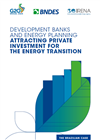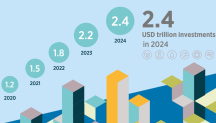

-
-
IRENA (2024), Development banks and energy planning: Attracting private investment for the energy transition; the Brazilian case, International Renewable Energy Agency, Abu Dhabi.
Copied
https://www.irena.org/-/media/Files/IRENA/Agency/Publication/2024/Sep/IRENA_BNDES_G20_Development_banks_2024.pdf
Copied
Development banks and energy planning: Attracting private investment for the energy transition; the Brazilian case
Newsletter
According to the World energy transitions outlook 2023, USD 150 trillion is required to finance an energy transition compatible with the 1.5°C pathway by 2050. Even though capital markets have sufficient funds to support such large investments, the central challenge lies in identifying suitable financial instruments and structures to ensure low-cost, long-term financing to support all necessary investments in the energy transition at the required rate, especially in jurisdictions with high perceived or real investment risks.
It is particularly challenging for emerging and developing economies (EMDEs) to attract private investment due to these perceived or real higher risks, unpredictable returns and the private sector’s preference for investing in low-risk mature markets. Moreover, the current financing environment has become more complex, with increasing macroeconomic risks and higher interest rates to mitigate inflationary pressures.
Brazil has, however, set a valuable example through its national development bank (the Brazilian Development Bank [BNDES]) and its planning authority (Ministry of Mines and Energy [MME]), with the assistance of its energy planning agency (the Energy Research Office [EPE]) and the broader domestic institutional framework, on how to expand renewable energy and infrastructure by scaling up private investments. The Brazilian example also demonstrates how the expansion of domestic industry supply chains can increase jobs and deliver positive local economic impacts via energy transition-related projects.




